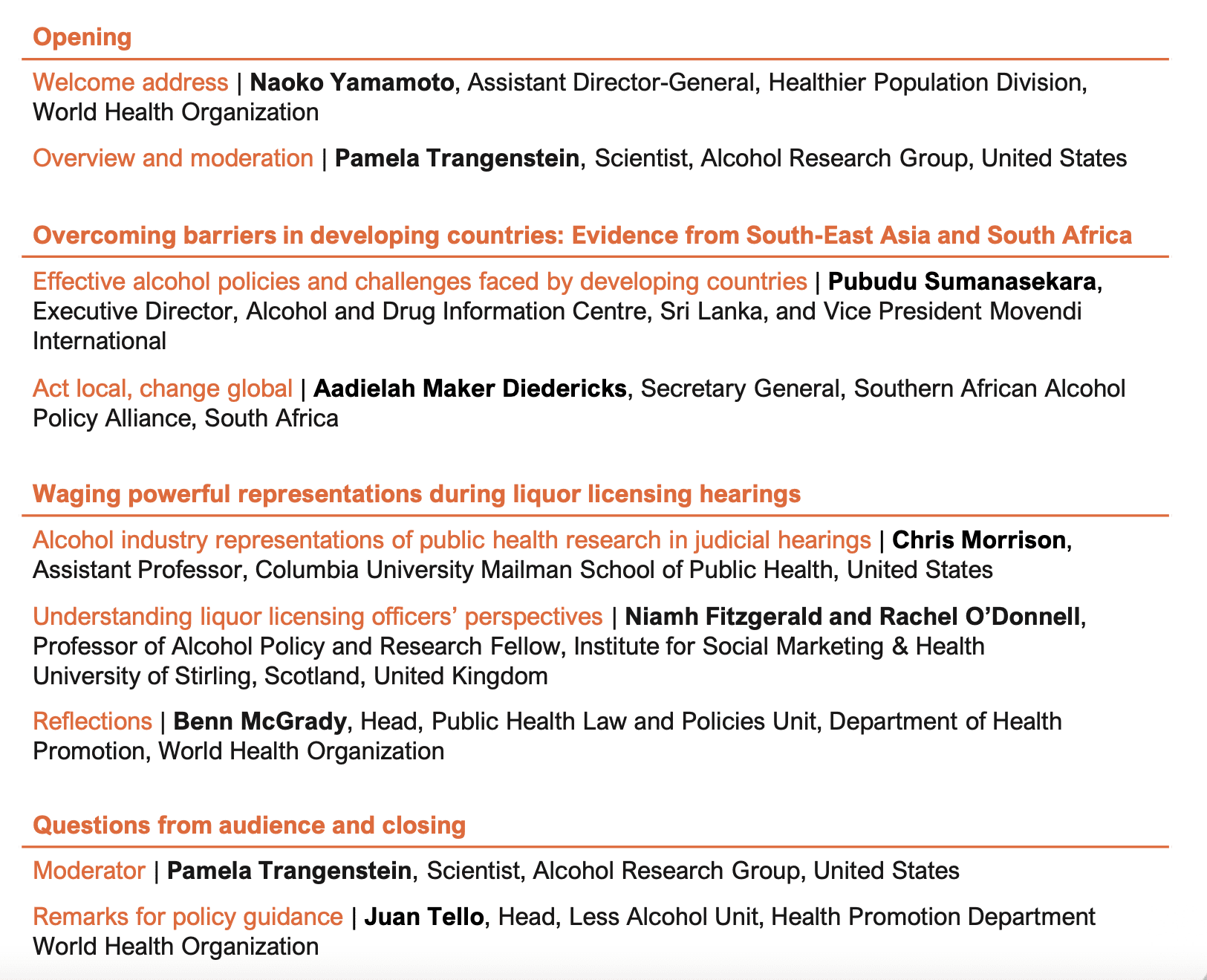
- This event has passed.
Oct 3 '22, 2:30 PM - 4:00 PM
Restricting Alcohol Availability: How Can Common Barriers Be Overcome?
About
This webinar will reflect on civil society successes and evidence-based strategies to promote alcohol availability laws and practices that may prevent the harmful use of alcohol. The discussion will identify local and national evidence-based interventions to restrict alcohol availability, supportive actions by civil society, and priority areas for researchers.
Alcohol physical availability – how easy or hard it is to obtain alcohol – is a key driver of alcohol consumption and its related harms. Despite the potential for evidence-based, cost-effective interventions to restrict alcohol availability and promote health gains, progress has been slow. Hurdles can arise when implementing evidence-based alcohol availability policies, but they are surmountable.
The alcohol industry often opposes evidence-based interventions restricting alcohol availability, particularly in developing countries. For example, the industry may partner with governments to craft policies that protect alcohol sales and omit the most effective strategies to reduce alcohol consumption. During the webinar, Pubudu Sumanasekara (Alcohol and Drug Information Center) will present the role of alcohol industry interference in alcohol availability laws in Sri Lanka and other developing countries.
A common industry tactic is to advocate expanding alcohol sales to more businesses, such as grocery stores and petrol stations. Community mobilization can overcome these efforts. Aadielah Diedericks (Southern African Alcohol Policy Alliance) will tell the story of how communities successfully stopped a campaign to sell alcohol in hundreds of petrol stations in the Western Cape of South Africa.
Protest hearings about new or nuisance alcohol establishments often position public health against the alcohol industry. About 10% of the alcohol establishments are responsible for over 50% of the problems, so protest hearings hold great potential to prevent them. Yet, public health presentations in these hearings are often “ineffective” and unsuccessful. The alcohol industry tends to reuse the same four types of arguments. Expecting and preparing strategic counters to these claims may help communities wage successful protests. Chris Morrison (Monash University) will summarize common arguments used during liquor license hearings.
Preparing compelling arguments in liquor license protest hearings requires understanding the perspective of liquor licensing officers. Some officers consider alcohol-related harm mainly focusing on high-risk people, e.g., those with alcohol use disorders rather than adopting a public health perspective. With this understanding, public health protestors can tailor their arguments to encourage licensing officers to consider broader harm, e.g., interpersonal violence, or adapt their arguments to fit this view, e.g., encouraging “responsible” alcohol use. Niamh Fitzgerald and Rachel O’Donnell (University of Stirling) will present the perspective of liquor licensing officers with regard to protest hearings.
The target audience is government officials, civil society associations, researchers, local authorities, public and consumer associations.
Please follow the link for the full concept note, here.
Program and speakers
Participation
Participation in this webinar is by invitation.
If you have not received one and are interested to attend, please contact us for more information on how to apply for consideration at:lessalcohol@who.int: Less Alcohol Unit – Department of Health Promotion.

